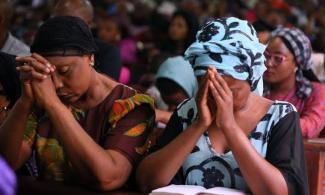
Religious institutions have also become entangled with the very forces of bad governance we seek to overthrow.
Religion, often seen as a source of hope and moral guidance, has paradoxically become a significant obstacle to the revolutionary change Nigeria desperately needs. The #RevolutionNow movement, aimed at dismantling bad governance and restoring accountability, faces resistance not only from the political class but also from a deeply religious society that has, knowingly or unknowingly, hindered its progress.
In Nigeria, religion wields immense influence over the lives of its people. With churches and mosques on nearly every corner, religious leaders command a level of loyalty and reverence that often surpasses that of political figures. While this influence could be channeled to demand justice and good governance, it has frequently been used to preach submission, patience, and acceptance of the status quo. Messages like “Leave it to God,” “Pray for your leaders,” and “God’s time is the best” have become tools of complacency, discouraging citizens from actively challenging systemic oppression.
Religious institutions have also become entangled with the very forces of bad governance we seek to overthrow. Many politicians exploit religion as a means to manipulate the masses, appearing in places of worship to seek blessings and endorsements. This creates a false narrative that they are divinely ordained, making it harder for citizens to question their authority or demand accountability. Religious leaders, in turn, often shy away from criticizing the government for fear of losing their privileges or being labeled as partisan.
Furthermore, religion has contributed to divisions among the populace. Instead of uniting under a common cause for justice and progress, Nigerians are often divided along religious lines. Movements like #RevolutionNow struggle to gain momentum because people prioritize their religious identities over their shared struggles. This division weakens collective action, allowing the ruling class to exploit these fractures to maintain their grip on power.
Another issue is the focus on miracles and quick fixes, which distracts from the need for sustained action and hard work. Many Nigerians, driven by religious teachings, hope for divine intervention rather than engaging in practical efforts to bring about change. While faith is not inherently harmful, relying solely on miracles to solve systemic issues undermines the spirit of activism and revolution.
To move forward, Nigerians must recognize the role religion plays in both their lives and the broader societal structure. Faith should inspire courage, unity, and the pursuit of justice, rather than complacency and division. Religious leaders must step up as advocates for good governance, using their platforms to hold leaders accountable rather than legitimizing oppression. Citizens must also learn to separate faith from politics, understanding that challenging bad governance is not an act of rebellion against God but a duty to ensure a better future.
The #RevolutionNow movement is not against religion—it is against the misuse of religion as a tool to suppress change. True progress in Nigeria will require breaking free from the chains of religious manipulation and embracing the courage to demand what is right. Only then can we build the just and equitable society we all deserve.